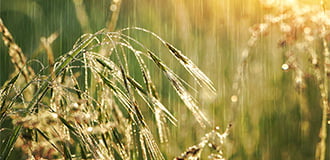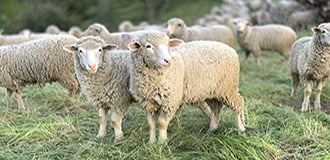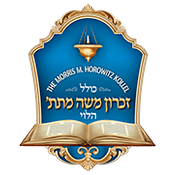Parshas V’zos HaBracha – Shemini Atzeres – Simchas Torah 1

Parshas V’zos HaBracha begins with Moshe Rabbeinu’s farewell blessing to the Bnei Yisroel. Moshe lauds the Bnei Yisroel by declaring ׳׳והם תכו לרגלך׳׳ . Rashi explains that Moshe was telling Hashem that the Bnei Yisroel are worthy of extra love and blessing because they entered…
Parshas Ha’azinu 1

Rashi explains that Moshe Rabbeinu called upon the Heavens and the Earth to be his eternal witnesses and testify that ׳׳יערף כמטר לקחי׳׳ – “My Torah falls like rain”. Said Moshe, “This is the testimony that you shall attest that I have said before you – the Torah that I have given to Yisrael is eternal life, just like rain which is the source of חיים לעולם…
Parshas Netzavim – Vayeilech 1

The Ksav Sofer explains that there are two possible times for Mashiach to arrive. One of these times is hidden from us and is known only to Hashem – this is the set time for the arrival of Mashiach. The alternative time is a well-known concept that is reliant on the Bnei Yisroel doing Teshuva and repentance. The pasuk says…
Parshas Ki Savo 1

Parshas Ki Savo begins with the mitzvah of Bikkurim, the commandment to bring the first fruit of the seven species that ripen in one’s field every year, up to the Beis Hamikdash. Upon his arrival there, he
would pronounce his thanks to Hashem for all of the blessing that Hashem had bestowed upon him. The Kli Yakar points out that the lashon of…
Parshas Ki Seitzei 1

The Gemara in Bava Metzia states ׳׳שה דאבידה לדברי הכל קשיא׳׳ . The word שה – sheep, in this pasuk, mentioned with regard to the mitzvah of returning lost objects, is unanimously superfluous. The Maharsha at the end of Makkos explains that the pasuk is alluding to עם ישראל , the שה פזורה who is…
Parshas Shoftim 1

This pasuk is the source for the commandment to hearken to the words of our Chachamim (scholars). Rashi explains that this mitzvah applies even if the Chachamim tell us that right is left or that left is right, and all the more so if they tell us that the right is indeed right and vice versa.
Parshas Eikev 1

Rashi brings the Medrash Tanchuma to explain the first pasuk of the Parsha as follows. If the “light” mitzvos that a person tramples with his heel, he will observe, then Hashem will keep His promise that He has made to his forefathers. The Imrei Shefer points out that this pasuk seems to be…
Parshas Vaeschanan 1

The Gemara in Brachos on דף לב brings down the story of a Chassid who was davening Shemoneh Esrei when he was chanced upon by a powerful king. The king greeted our hero, who did not respond. The king waited until the Chassid finished his Tefillah before berating him.
Parshas Devarim 1

The Ramban in his introduction states that the Sefer of Devarim, otherwise known as “Mishnah Torah” begins with Moshe Rabbeinu reprimanding the Bnei Yisrael for their previously committed sins while simultaneously reminding them that despite their waywardness, Hashem still…
Parshas Matos-Maasei 1

Rashi explains that we learn from this pasuk that Moshe Rabbeinu was חלק כבודלנשיאים by teaching them first, and only afterwards continuing to teach the rest of Bnei Yisroel. Rashi continues to explain that it was in this same order that Moshe gave over all of the commandments to the nation, and the reason…
